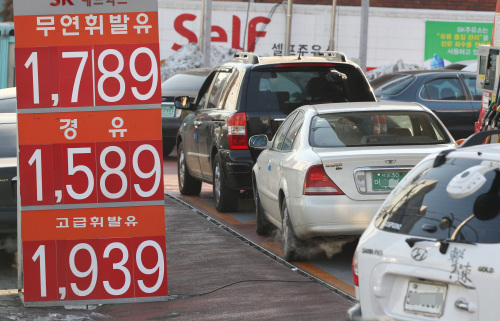Government and industry in dispute over whether to cut margins or fuel taxes
The government and oil refiners are at loggerheads over how to stabilize fuel prices as the nation is fighting an uphill battle to curb inflation driven by international commodities prices.
Oil companies have been the key target of the government’s campaign against inflation since early January.
Officials have been calling on them to cut prices while regulators are conducting sweeping probes into possible price collusion.
The companies resisted the pressure, claiming the real culprit is fuel taxes.
Retail fuel prices have been increasing for 16 consecutive weeks last week as international crudes hit two-year highs.
The government and oil refiners are at loggerheads over how to stabilize fuel prices as the nation is fighting an uphill battle to curb inflation driven by international commodities prices.
Oil companies have been the key target of the government’s campaign against inflation since early January.
Officials have been calling on them to cut prices while regulators are conducting sweeping probes into possible price collusion.
The companies resisted the pressure, claiming the real culprit is fuel taxes.
Retail fuel prices have been increasing for 16 consecutive weeks last week as international crudes hit two-year highs.

The government began to harden its scrutiny after President Lee Myung-bak raised questions about runaway fuel prices on Jan. 13.
“When international crude oil prices shot up to $140 per barrel in 2008, domestic retail oil prices rose to 2,000 won ($1.7) per liter. These days, crude prices have fallen to $80-$90 per barrel. But domestic gasoline prices remain in the range of 1,800 to 1,900 won per liter. Isn’t this bizarre?” he said.
Lee stressed the importance of stable oil prices which affect a wide range of consumer prices.
Following Lee’s remarks, the Fair Trade Commission promptly launched a probe into alleged price-fixing and other irregularities involving SK Innovation (formerly SK Energy), GS Caltex, S-Oil and Hyundai Oilbank.
Last week, the Ministry of Knowledge Economy also launched a taskforce to look into petroleum prices together with the Finance Ministry, the FTC and private experts.
New Minister of Knowledge Economy Choi Joong-kyung, who officially took office Thursday, pledged to give priority to stabilizing oil prices.
“The government will look into the price structure of oil products as well as their distribution margins,” he told reporters.
Despite the government’s pressure, however, refiners seem to be wary of reducing margins they deem unrealistic and ineffective.
The government should cut fuel taxes instead of forcing refiners to lower prices, industry insiders and watchers argue.
“It is realistically difficult for refiners to cut oil prices given their small profit margins. Lowering their margins will not significantly bring down retail prices,” an industry official said.
“I don’t think it’s appropriate for the industry to discuss reduction of fuel tax or oil prices especially at this point,” said another industry official who requested anonymity. He added that they are not planning to cut the price of petroleum products.
In addition, refiners have little influence in controlling prices at privately-owned gas stations. Currently there are more of them nationwide than those directly managed by refiners, they noted.
Fuel taxes currently account for around half of oil prices, according to the industry. It currently stands at 529 won per liter.
The government has lowered the petroleum tax by 82 won per liter during the 2008 financial crisis. The tax cut was only temporary and is not in place now.
The government is expected to collect over 12 trillion won from such taxes in 2011, according to the National Assembly Budget Office.
Experts say that what fuel taxes are used for does not justify their existence. There have been continuous calls for the government to abolish them.
Fuel taxes, which comprise of those on energy, environment and transportation, are mostly being used for construction and maintenance of roads and railways throughout the nation.
The government initially lowered the budget allocation on roads this year to 7.2 trillion won, saying that the country will stop building roads which contribute to more carbon emissions and harm the environment.
Yet the amount was increased by 26 billion won after a screening by the National Assembly. This time, the government attributed such a decision to the conditions of roads in the country not meeting the standards of the Organization of Economic Co-operation and Development.
Industry watchers say that such an increase came from a power struggle in political circles where lawmakers strive to secure support in their constituencies ahead of next year’s elections.
Meanwhile, the average price of the product was 1,834 won Sunday, according to Korea National Oil Corp. The benchmark Dubai Crude Oil marked $93.44 per barrel as of Friday.
(youngaah@heraldcorp.com)







![[Graphic News] More Koreans say they plan long-distance trips this year](http://res.heraldm.com/phpwas/restmb_idxmake.php?idx=644&simg=/content/image/2024/04/17/20240417050828_0.gif&u=)
![[KH Explains] Hyundai's full hybrid edge to pay off amid slow transition to pure EVs](http://res.heraldm.com/phpwas/restmb_idxmake.php?idx=644&simg=/content/image/2024/04/18/20240418050645_0.jpg&u=20240419100350)





![[From the Scene] Monks, Buddhists hail return of remains of Buddhas](http://res.heraldm.com/phpwas/restmb_idxmake.php?idx=652&simg=/content/image/2024/04/19/20240419050617_0.jpg&u=20240419175937)

![[KH Explains] Hyundai's full hybrid edge to pay off amid slow transition to pure EVs](http://res.heraldm.com/phpwas/restmb_idxmake.php?idx=652&simg=/content/image/2024/04/18/20240418050645_0.jpg&u=20240419100350)

![[Today’s K-pop] Illit drops debut single remix](http://res.heraldm.com/phpwas/restmb_idxmake.php?idx=642&simg=/content/image/2024/04/19/20240419050612_0.jpg&u=)